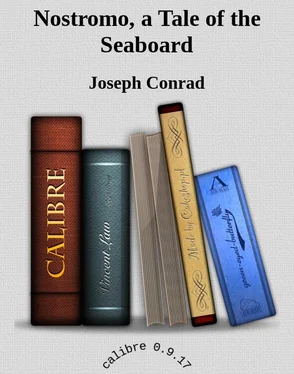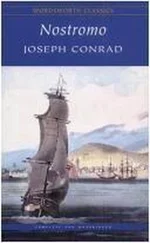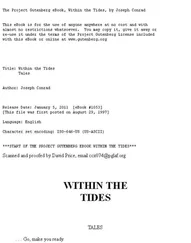Joseph Conrad - Nostromo, a Tale of the Seaboard
Здесь есть возможность читать онлайн «Joseph Conrad - Nostromo, a Tale of the Seaboard» весь текст электронной книги совершенно бесплатно (целиком полную версию без сокращений). В некоторых случаях можно слушать аудио, скачать через торрент в формате fb2 и присутствует краткое содержание. Жанр: Старинная литература, на английском языке. Описание произведения, (предисловие) а так же отзывы посетителей доступны на портале библиотеки ЛибКат.
- Название:Nostromo, a Tale of the Seaboard
- Автор:
- Жанр:
- Год:неизвестен
- ISBN:нет данных
- Рейтинг книги:4 / 5. Голосов: 1
-
Избранное:Добавить в избранное
- Отзывы:
-
Ваша оценка:
- 80
- 1
- 2
- 3
- 4
- 5
Nostromo, a Tale of the Seaboard: краткое содержание, описание и аннотация
Предлагаем к чтению аннотацию, описание, краткое содержание или предисловие (зависит от того, что написал сам автор книги «Nostromo, a Tale of the Seaboard»). Если вы не нашли необходимую информацию о книге — напишите в комментариях, мы постараемся отыскать её.
Nostromo, a Tale of the Seaboard — читать онлайн бесплатно полную книгу (весь текст) целиком
Ниже представлен текст книги, разбитый по страницам. Система сохранения места последней прочитанной страницы, позволяет с удобством читать онлайн бесплатно книгу «Nostromo, a Tale of the Seaboard», без необходимости каждый раз заново искать на чём Вы остановились. Поставьте закладку, и сможете в любой момент перейти на страницу, на которой закончили чтение.
Интервал:
Закладка:
NOSTROMO
A TALE OF THE SEABOARD
By Joseph Conrad
"So foul a sky clears not without a storm." —SHAKESPEARE
TO JOHN GALSWORTHY
Contents
AUTHOR'S NOTE
NOSTROMO
PART FIRST THE SILVER OF THE MINE
CHAPTER ONE
CHAPTER TWO
CHAPTER THREE
CHAPTER FOUR
CHAPTER FIVE
CHAPTER SIX
CHAPTER SEVEN
CHAPTER EIGHT
PART SECOND THE ISABELS
CHAPTER ONE
CHAPTER TWO
CHAPTER THREE
CHAPTER FOUR
CHAPTER FIVE
CHAPTER SIX
CHAPTER SEVEN
CHAPTER EIGHT
PART THIRD THE LIGHTHOUSE
CHAPTER ONE
CHAPTER TWO
CHAPTER THREE
CHAPTER FOUR
CHAPTER FIVE
CHAPTER SIX
CHAPTER SEVEN
CHAPTER EIGHT
CHAPTER NINE
CHAPTER TEN
CHAPTER ELEVEN
CHAPTER TWELVE
CHAPTER THIRTEEN
AUTHOR'S NOTE
" Nostromo " is the most anxiously meditated of the longer novels which belong to the period following upon the publication of the "Typhoon" volume of short stories.
I don't mean to say that I became then conscious of any impending change in my mentality and in my attitude towards the tasks of my writing life. And perhaps there was never any change, except in that mysterious, extraneous thing which has nothing to do with the theories of art; a subtle change in the nature of the inspiration; a phenomenon for which I can not in any way be held responsible. What, however, did cause me some concern was that after finishing the last story of the "Typhoon" volume it seemed somehow that there was nothing more in the world to write about.
This so strangely negative but disturbing mood lasted some little time; and then, as with many of my longer stories, the first hint for "Nostromo" came to me in the shape of a vagrant anecdote completely destitute of valuable details.
As a matter of fact in 1875 or '6, when very young, in the West Indies or rather in the Gulf of Mexico, for my contacts with land were short, few, and fleeting, I heard the story of some man who was supposed to have stolen single-handed a whole lighter-full of silver, somewhere on the Tierra Firme seaboard during the troubles of a revolution.
On the face of it this was something of a feat. But I heard no details, and having no particular interest in crime qua crime I was not likely to keep that one in my mind. And I forgot it till twenty-six or seven years afterwards I came upon the very thing in a shabby volume picked up outside a second-hand book-shop. It was the life story of an American seaman written by himself with the assistance of a journalist. In the course of his wanderings that American sailor worked for some months on board a schooner, the master and owner of which was the thief of whom I had heard in my very young days. I have no doubt of that because there could hardly have been two exploits of that peculiar kind in the same part of the world and both connected with a South American revolution.
The fellow had actually managed to steal a lighter with silver, and this, it seems, only because he was implicitly trusted by his employers, who must have been singularly poor judges of character. In the sailor's story he is represented as an unmitigated rascal, a small cheat, stupidly ferocious, morose, of mean appearance, and altogether unworthy of the greatness this opportunity had thrust upon him. What was interesting was that he would boast of it openly.
He used to say: "People think I make a lot of money in this schooner of mine. But that is nothing. I don't care for that. Now and then I go away quietly and lift a bar of silver. I must get rich slowly—you understand."
There was also another curious point about the man. Once in the course of some quarrel the sailor threatened him: "What's to prevent me reporting ashore what you have told me about that silver?"
The cynical ruffian was not alarmed in the least. He actually laughed. "You fool, if you dare talk like that on shore about me you will get a knife stuck in your back. Every man, woman, and child in that port is my friend. And who's to prove the lighter wasn't sunk? I didn't show you where the silver is hidden. Did I? So you know nothing. And suppose I lied? Eh?"
Ultimately the sailor, disgusted with the sordid meanness of that impenitent thief, deserted from the schooner. The whole episode takes about three pages of his autobiography. Nothing to speak of; but as I looked them over, the curious confirmation of the few casual words heard in my early youth evoked the memories of that distant time when everything was so fresh, so surprising, so venturesome, so interesting; bits of strange coasts under the stars, shadows of hills in the sunshine, men's passions in the dusk, gossip half-forgotten, faces grown dim. . . . Perhaps, perhaps, there still was in the world something to write about. Yet I did not see anything at first in the mere story. A rascal steals a large parcel of a valuable commodity—so people say. It's either true or untrue; and in any case it has no value in itself. To invent a circumstantial account of the robbery did not appeal to me, because my talents not running that way I did not think that the game was worth the candle. It was only when it dawned upon me that the purloiner of the treasure need not necessarily be a confirmed rogue, that he could be even a man of character, an actor and possibly a victim in the changing scenes of a revolution, it was only then that I had the first vision of a twilight country which was to become the province of Sulaco, with its high shadowy Sierra and its misty Campo for mute witnesses of events flowing from the passions of men short-sighted in good and evil.
Such are in very truth the obscure origins of "Nostromo"—the book. From that moment, I suppose, it had to be. Yet even then I hesitated, as if warned by the instinct of self-preservation from venturing on a distant and toilsome journey into a land full of intrigues and revolutions. But it had to be done.
It took the best part of the years 1903-4 to do; with many intervals of renewed hesitation, lest I should lose myself in the ever-enlarging vistas opening before me as I progressed deeper in my knowledge of the country. Often, also, when I had thought myself to a standstill over the tangled-up affairs of the Republic, I would, figuratively speaking, pack my bag, rush away from Sulaco for a change of air and write a few pages of the "Mirror of the Sea." But generally, as I've said before, my sojourn on the Continent of Latin America, famed for its hospitality, lasted for about two years. On my return I found (speaking somewhat in the style of Captain Gulliver) my family all well, my wife heartily glad to learn that the fuss was all over, and our small boy considerably grown during my absence.
My principal authority for the history of Costaguana is, of course, my venerated friend, the late Don Jose Avellanos, Minister to the Courts of England and Spain, etc., etc., in his impartial and eloquent "History of Fifty Years of Misrule." That work was never published—the reader will discover why—and I am in fact the only person in the world possessed of its contents. I have mastered them in not a few hours of earnest meditation, and I hope that my accuracy will be trusted. In justice to myself, and to allay the fears of prospective readers, I beg to point out that the few historical allusions are never dragged in for the sake of parading my unique erudition, but that each of them is closely related to actuality; either throwing a light on the nature of current events or affecting directly the fortunes of the people of whom I speak.
As to their own histories I have tried to set them down, Aristocracy and People, men and women, Latin and Anglo-Saxon, bandit and politician, with as cool a hand as was possible in the heat and clash of my own conflicting emotions. And after all this is also the story of their conflicts. It is for the reader to say how far they are deserving of interest in their actions and in the secret purposes of their hearts revealed in the bitter necessities of the time. I confess that, for me, that time is the time of firm friendships and unforgotten hospitalities. And in my gratitude I must mention here Mrs. Gould, "the first lady of Sulaco," whom we may safely leave to the secret devotion of Dr. Monygham, and Charles Gould, the Idealist-creator of Material Interests whom we must leave to his Mine—from which there is no escape in this world.
Читать дальшеИнтервал:
Закладка:
Похожие книги на «Nostromo, a Tale of the Seaboard»
Представляем Вашему вниманию похожие книги на «Nostromo, a Tale of the Seaboard» списком для выбора. Мы отобрали схожую по названию и смыслу литературу в надежде предоставить читателям больше вариантов отыскать новые, интересные, ещё непрочитанные произведения.
Обсуждение, отзывы о книге «Nostromo, a Tale of the Seaboard» и просто собственные мнения читателей. Оставьте ваши комментарии, напишите, что Вы думаете о произведении, его смысле или главных героях. Укажите что конкретно понравилось, а что нет, и почему Вы так считаете.












